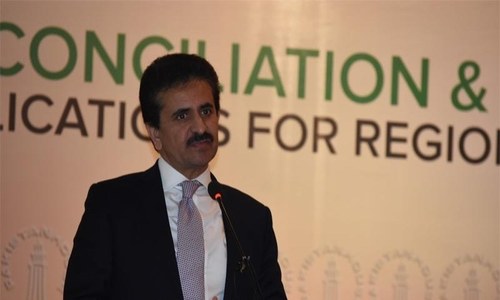DOHA: US Secretary of State Mike Pompeo met negotiators from the Afghan government and the Taliban in Doha on Saturday, amid signs of progress in their talks as Washington speeds up its withdrawal. Pompeo met separately with the Afghan government and Taliban negotiation teams in a luxury hotel in the Qatari capital.
“I would be most interested in getting your thoughts on how we can increase the probability of a successful outcome”, Pompeo said as he met the Afghan government side, noting the shared interest in such a scenario.
He also met Qatar’s ruler, Emir Sheikh Tamim bin Hamad Al-Thani, and Mohammed bin Abdulrahman Al-Thani, the foreign minister, on his stop in Doha, which is the Taliban’s base for diplomacy.
The outgoing top US diplomat is on a seven-nation tour of Europe and the Middle East, as President Donald Trump shores up late-term priorities.
Earlier this week, the Pentagon said it would soon pull some 2,000 troops out of Afghanistan, speeding up the timeline established in a February agreement between Washington and the Taliban that envisions a full US withdrawal in mid-2021.
Trump has repeatedly vowed to end “forever wars”, including in Afghanistan, America’s longest-ever conflict that began with an invasion to dislodge the Taliban following the Sept 11, 2001 attacks.
President-elect Joe Biden, in a rare point of agreement with Trump, also advocates winding down the Afghanistan war, although analysts believe he will not be as wedded to a rapid withdrawal.
The Taliban are speaking to Afghanistan’s government for the first time.
The talks started on Sept 12 in Doha but almost immediately faltered over disagreements about the agenda, the basic framework of discussions and religious interpretations.
Several sources said that the two sides appear to have resolved some of the issues, however.
Among the sticking points so far, the Taliban and the Afghan government have struggled to agree on common language on two main issues.
The Taliban, who are Sunni hardliners, are insisting on adherence to the Hanafi school of Islamic jurisprudence, but government negotiators say this could be used to discriminate against Hazaras, who are predominantly Shia, and other minorities.
Another contentious topic is how the US-Taliban deal will shape a future Afghan peace deal and how it will be referred to.
The Doha peace talks opened after the Taliban and Washington signed a deal in February, with the US agreeing to withdraw all foreign forces in exchange for security guarantees and a Taliban promise to start talks.
Despite the talks, violence has surged across Afghanistan, with the Taliban stepping up daily attacks against Afghan security forces.
Trump’s plan to slash troops by Jan 15 — less than a week before his successor Joe Biden is to be sworn in to office — has been criticised by Kabul residents who fear it will embolden the Taliban to unleash a new wave of fighting.
Afghan civilians have long borne the brunt of the country’s bloodshed.
Officials in Kabul also worry it will harden the Taliban position at the negotiating table, where the future of hard-won gains including women’s rights are on the line.
Published in Dawn, November 22nd, 2020













































